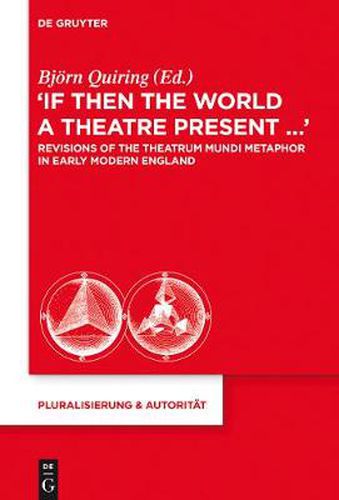Readings Newsletter
Become a Readings Member to make your shopping experience even easier.
Sign in or sign up for free!
You’re not far away from qualifying for FREE standard shipping within Australia
You’ve qualified for FREE standard shipping within Australia
The cart is loading…






To metaphorize the world as a theatre has been a common procedure since antiquity, but the use of this trope became particularly prominent and pregnant in early modern times, especially in England. Old and new applications of the theatrum mundi topos pervaded discourses, often allegorizing the deceitfulness and impermanence of this world as well as the futility of earthly strife. It was frequently woven into arguments against worldly amusements such as the stage: Commercial theatre was declared an undesirable competitor of God’s well-ordered world drama.
Early modern dramatists often reacted to this development by appropriating the metaphor, and in an ingenious twist, some playwrights even appropriated its anti-theatrical impetus: Early modern theatre seemed to discover a denial of its own theatricality at its very core. Drama was found to succeed best when it staged itself as a great unmasking.
To investigate the reasons and effects of these developments, the anthology examines the metaphorical uses of theatre in plays, pamphlets, epics, treatises, legal proclamations and other sources.
$9.00 standard shipping within Australia
FREE standard shipping within Australia for orders over $100.00
Express & International shipping calculated at checkout
To metaphorize the world as a theatre has been a common procedure since antiquity, but the use of this trope became particularly prominent and pregnant in early modern times, especially in England. Old and new applications of the theatrum mundi topos pervaded discourses, often allegorizing the deceitfulness and impermanence of this world as well as the futility of earthly strife. It was frequently woven into arguments against worldly amusements such as the stage: Commercial theatre was declared an undesirable competitor of God’s well-ordered world drama.
Early modern dramatists often reacted to this development by appropriating the metaphor, and in an ingenious twist, some playwrights even appropriated its anti-theatrical impetus: Early modern theatre seemed to discover a denial of its own theatricality at its very core. Drama was found to succeed best when it staged itself as a great unmasking.
To investigate the reasons and effects of these developments, the anthology examines the metaphorical uses of theatre in plays, pamphlets, epics, treatises, legal proclamations and other sources.